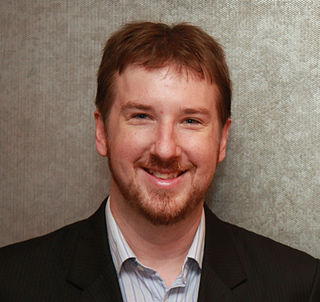Barrington Somers Pheloung is an Australian composer based in England.

Matthew Ingvald Dewey is an Australian classical music composer, singer, and music producer.
Ian Cresswell is an Australian composer born in 1968. He obtained Bachelor of Music at the Australian National University in 1996 and Master of Music at the University of Queensland in 2002. Cresswell is currently doing postgraduate studies at the Conservatorium of Music at the University of Tasmania.
Maria Grenfell is an Australian composer of New Zealand origin.
Carl Vine,, is an Australian composer of contemporary classical music. From 1975 he has worked as a freelance pianist and composer with a variety of theatre and dance companies, and ensembles. Vine's catalogue includes seven symphonies, eleven concertos, music for film, television and theatre, electronic music and numerous chamber works. Since 2000 he has been the Artistic Director of Musica Viva Australia. In 2005 he was awarded the Don Banks Music Award. In the 2014 Queen's Birthday Honours List, Vine was appointed as an Officer of the Order of Australia (AO), "for distinguished service to the performing arts as a composer, conductor, academic and artistic director, and to the support and mentoring of emerging performers."
Michael Robert Garth Lampard is an Australian opera singer, conductor and composer born in Hobart, Tasmania.
Graeme Koehne,, is an Australian composer and music educator. He is best known for his orchestral and ballet scores, which are characterised by direct communicative style and embrace of triadic tonality. His orchestral trilogy Unchained Melody, Powerhouse, and Elevator Music makes allusions to Hollywood film score traditions, cartoon music, popular Latin music and other dance forms.

Donald Henry Kay AM is an Australian classical composer.
David Porcelijn is a Dutch composer and conductor.
Tesla – Lightning in His Hand is a large-scale opera about Serbian American engineer and inventor Nikola Tesla, composed by Constantine Koukias a Tasmanian composer and opera director of Greek ancestry based in Amsterdam, where he is known by his Greek name of Konstantin Koukias, with libretto by Marianne Fisher.
The Lunch Box is a chamber opera by Thai composer Thanapoom Sirichang and Thai librettist Bringkop Vora-Urai. Composed entirely in Tasmania under the guidance of IHOS Artistic Director Constantine Koukias, The Lunch Box may be the first opera sung in Thai to blend traditional Thai music and contemporary Western opera.
Prayer Bells is a choral concert piece by Tasmanian (Australian) composer Constantine Koukias featuring dozens of handbells cast for the celebration of Australia's 2001 Centenary of Federation. Also comprising three solo cantors and a small male choir, the one-hour work premiered at the Federation Festival of Melbourne in 2001. Since then it has been performed in Australia in Launceston, Canberra, Adelaide, Melbourne, Hobart, Wollongong and Sydney. It had its USA premiere at the Chicago Cultural Center.
MIKROVION, by Constantine Koukias a Tasmanian composer and opera director of Greek ancestry based in Amsterdam, where he is known by his Greek name of Konstantin Koukias. This opera is described by Maria Shevtsova as "an epic opera about AIDS".
The Divine Kiss — The Evil is Always and Everywhere is an opera by Constantine Koukias a Tasmanian composer and opera director of Greek ancestry based in Amsterdam, where he is known by his Greek name of Konstantin Koukias. The opera explores the imagery of the seven saving virtues: prudence, justice, fortitude, temperance, faith, hope and charity.
Olegas is an opera based on the life of Lithuanian-born Tasmanian wilderness photographer Olegas Truchanas. Music for the opera was composed by Constantine Koukias a Tasmanian composer and opera director of Greek ancestry based in Amsterdam, where he is known by his Greek name of Konstantin Koukias. The libretto was written by Natasha Cica.
The Priest's Passion is a one scene chamber opera by Australian composer Matthew Dewey, and was first produced by the IHOS Music Theatre Laboratory together with the Tasmanian Conservatorium of Music in September 2004. It premiered at the Stanley Burbury Theatre at the University of Tasmania in 2004 and was subsequently recorded by ABC Classic FM. The work, which explores the nature of religious angst is a symbolist opera.
Gordon Kerry is an Australian composer, music administrator, music writer and music critic.


